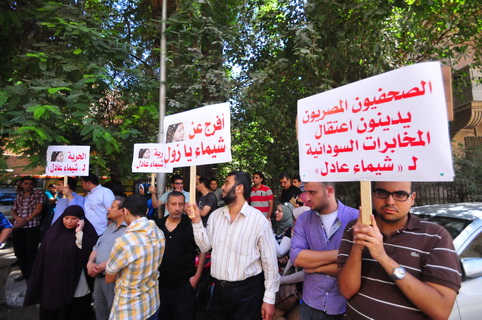CAIRO: Most political powers agreed that they would participate in mass protests on May 27 to reiterate their demands and revive Egypt’s Jan. 25 Revolution, stressing that they didn’t call for an open sit-in or a “second revolution.”
“Our revolution is still ongoing, so we can’t have a second one,” Mohamed Farag, secretary general of the Tagammu Party, told Daily News Egypt.
“We don’t want any clashes to occur between the people and the army on Friday. We merely want to support and reiterate the people’s demands,” he added.
“There will be no open sit-in on Friday, but there will be a million man march to stress the people’s demands,” Mohamed Adel, a spokesman for the April 6 Youth Movement, told DNE.
Activists have been calling for what was dubbed online as the “second revolution of rage”. But some have called for labeling it as a million man march, urging others not to stage a sit-in.
The Muslim Brotherhood is yet to decide on it’s participation in Friday’s mass protests.
“We will probably discuss the issue tomorrow to make our final decision,” said Rashad Bayoumi, deputy leader of the Muslim Brotherhood.
“However, the idea of having an open sit-in in Tahrir now is out of the question,” he added. “We can’t go backwards as if this revolution never took place.”
“The people need to realize that we need to cooperate in order to propose practical solutions to our problems that won’t affect the wheel of production and economy in Egypt,” he added.
Political powers disagreed on whether they should call for a presidential council that includes civilians and military officers to rule the country in this transitional period instead of the Supreme Council of the Armed forces (SCAF).
SCAF took the helm when former president Mubarak was ousted by a popular revolt on Feb 11.
Activists, commentators and politicians have criticized SCAF for taking unilateral decisions in issuing laws, subjecting peaceful protesters to military trials and violating their rights, in addition to prolonging Mubarak’s investigations and those of other corrupt figures.
“The coalition and the people are divided on whether they want to be ruled by a presidential council or not,” Tarek El- Kholy, member of the Coalition of the Youth of the Revolution, said. Adel agreed saying that it would be difficult to call for a Presidential Council now.
However, Farag, Al-Ghad Party’s Secretary General Wael Nawara and Karima Al-Hifnawy, leading member of the Kefaya movement and the National Association for Change (NAC), disagreed, saying that a presidential council would relieve the army from ruling the country for more than six months as it initially promised.
“We call for a presidential council with all respect to the army and not as a confrontation with it,” Farag said.
There are, however, other demands with less disagreement.
Except for the Brotherhood, most political powers agreed on the necessity of drafting the new constitution before parliamentary elections scheduled for September.
“Eighteen million Egyptians voted on the constitutional amendments and said their word,” Bayoumi said. “Political powers need to learn to respect the majority’s opinion.”.
According to the proposed amendments to Article 189, the elected members of the new parliament must appoint a 100-member constituent assembly to draft a new constitution within six months of its appointment.
The new constitution would be approved by a referendum within 15 days of its completion.
On March 19, 77.2 percent voted yes in a referendum on the constitutional amendments, while 22.8 percent voted no.
However El-Hifnawy said that “the referendum was held on amendments on 6 articles in the 1971 constitution, not the (62) articles announced by the army later in a constitutional decree which invalidates the amendments and the 1971 constitution.”
Nawara agreed, saying, “There will be a conflict of interest if the parliament chooses the committee that will draft the new constitution.
“The constitution is supposed to regulate responsibilities and relationships between the country’s authorities including the parliament. The parliament will definitely help establish a constitution that enforces its authority and serves its best interests.”
The political powers are also calling for a swift prosecution of Mubarak and members of the former regime, an end to subjecting civilians to military prosecutions, the release of political detainees, the removal of governors and heads of municipal councils assigned by the former corrupt regime, transparency in the SCAF’s decision-making mechanism and performance, and restoring security and safety back to Egypt.
Political powers including, the Coalition of the Youth of the Revolution, April 6 Youth and the Kefaya Movements, NAC, and Al-Wafd, Al-Tagammu and Al-Ghad parties have all announced their participation in the mass protests on May 27.
